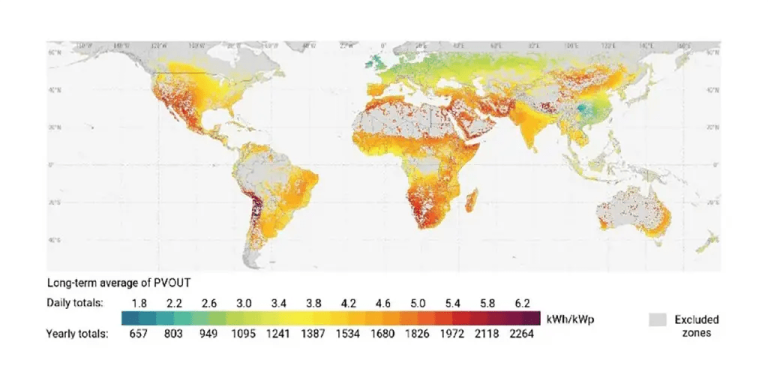not many people know
Paul Homewood
h/t Philip Bratby
In 2020, the World Bank released a report on the potential of solar energy:

https://www.worldbank.org/en/topic/energy/publication/solar-photovoltaic-power-potential-by-country
This is a fairly detailed analysis that takes into account not only sunlight itself, but also the effects of air temperature, terrain horizon and albedo, as well as module tilt, configuration, shadows,
contamination and other factors that affect system performance.
It is measured like this:
PVOUT is the long-term energy production per unit of photovoltaic installation capacity (specific energy production), measured in kilowatt-hours per installation peak (kWh/kWp).

Global map showing actual solar potential after excluding physical, environmental and other factors
The UK ranked 229th out of 230 countries assessed. Only Ireland fared worse!

Despite this, idiot Miliband wants to triple UK solar power generation to 47 GW in the next five years.
According to BEIS levelized costs, capital expenditure for large-scale solar is £410/kW, equivalent to £19.3 billion.
Annual production is 45 TWh and operating costs are £10/MWh, or £450 million per year.
The total cost will be £26 billion over 15 years.
We still need a full suite of combined cycle gas turbine power plants, with all the associated costs. Without solar, the only additional cost we would incur would be fuel.
DESNZ forecasts that gas prices will be around 70p/ther between now and 2032, which at current prices is £24/MWh.
Assuming a fuel efficiency of 53%, CCGT's fuel cost will be £45.28 per MWh of electricity. At 45 TWh per year, this equates to £2 billion, or £30 billion within 15 years.
On the face of it, solar energy could save £4 billion, but these costs do not include capital costs. For example, a return on capital of 10% would cost £1.9 billion per year.
On top of that are storage costs to manage variable output during the day and avoid discarding excess power during periods of peak output and low demand.
When all factors are taken into account, there is no need to go solar.
Relevant
Learn more from Watts Up With That?
Subscribe to have the latest posts delivered to your email.
